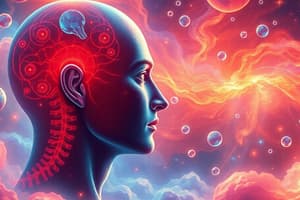Podcast
Questions and Answers
What are the primary classes of analgesics mentioned in the text?
What are the primary classes of analgesics mentioned in the text?
- Antidepressants, antipsychotics, anxiolytics, anticonvulsants
- Antibiotics, antivirals, antifungals, antiparasitics
- Steroids, antihistamines, muscle relaxants, benzodiazepines
- Acetaminophen, NSAIDs, opioids, medications for neuropathic pain (correct)
What is MAT in the context of opioid use disorder management?
What is MAT in the context of opioid use disorder management?
- Medication Analysis and Testing for drug abuse
- Medication Application and Therapy for chronic pain
- The use of medications to treat persons with opiate use disorder (correct)
- Medication-Assisted Treatment for mental health disorders
What are the characteristic pharmacologic effects of different opioid receptors?
What are the characteristic pharmacologic effects of different opioid receptors?
- Bronchodilation, vasodilation, increased heart rate, and diuresis
- Analgesia, respiratory depression, sedation, and euphoria (correct)
- Muscle relaxation, anxiolysis, antiemesis, and cognitive impairment
- Antipyresis, anti-inflammatory effects, platelet aggregation, and vasoconstriction
What is the goal of pain management according to the text?
What is the goal of pain management according to the text?
What is the correct dosing strategy for managing breakthrough pain during around the clock (ATC) opioid dosing?
What is the correct dosing strategy for managing breakthrough pain during around the clock (ATC) opioid dosing?
What is the recommended approach for managing end-of-dose pain during opioid medication?
What is the recommended approach for managing end-of-dose pain during opioid medication?
What is the effect of parenteral administration of opioids within 2-4 hours of delivery on the neonate?
What is the effect of parenteral administration of opioids within 2-4 hours of delivery on the neonate?
What is the recommended approach for managing predictable incident pain in patients?
What is the recommended approach for managing predictable incident pain in patients?
Which medication is considered a first-line treatment for neuropathic pain?
Which medication is considered a first-line treatment for neuropathic pain?
Which medication is considered a second-tier guideline therapy for neuropathic pain?
Which medication is considered a second-tier guideline therapy for neuropathic pain?
What is the recommended approach for managing breakthrough pain with a neuropathic origin?
What is the recommended approach for managing breakthrough pain with a neuropathic origin?
What is the correct strategy for managing breakthrough pain in opioid-tolerant patients?
What is the correct strategy for managing breakthrough pain in opioid-tolerant patients?
Which opioid receptor do opiate agonists primarily bind to?
Which opioid receptor do opiate agonists primarily bind to?
What is the main physiological effect of opiate/opioid agonists?
What is the main physiological effect of opiate/opioid agonists?
Which opioid is derived from the opium poppy plant and is considered a prototypical full mu agonist?
Which opioid is derived from the opium poppy plant and is considered a prototypical full mu agonist?
What is the active metabolite of morphine that is formed in the liver?
What is the active metabolite of morphine that is formed in the liver?
Which opioid is known for its potency, being more potent than morphine?
Which opioid is known for its potency, being more potent than morphine?
Which opioid is associated with the risk of accumulation of its active metabolite, normeperidine, leading to neuro excitation and seizures?
Which opioid is associated with the risk of accumulation of its active metabolite, normeperidine, leading to neuro excitation and seizures?
Which opioid is a controlled-release formulation of oxycodone, dosed every 12 hours?
Which opioid is a controlled-release formulation of oxycodone, dosed every 12 hours?
What is the main physiological effect of opioid overdose?
What is the main physiological effect of opioid overdose?
What is the peak onset time for intrathecal administration of morphine?
What is the peak onset time for intrathecal administration of morphine?
Which opioid is known for its potency and is available as a transdermal patch for continuous pain management?
Which opioid is known for its potency and is available as a transdermal patch for continuous pain management?
What is the primary mechanism of action of opiate agonists in exerting analgesic effects?
What is the primary mechanism of action of opiate agonists in exerting analgesic effects?
Which opioid is commonly used for the treatment of diarrhea due to its antidiarrheal effects?
Which opioid is commonly used for the treatment of diarrhea due to its antidiarrheal effects?
Which type of pain is caused by nerve damage or persistent stimulation?
Which type of pain is caused by nerve damage or persistent stimulation?
What is the main site of painful stimuli in nociceptive pain?
What is the main site of painful stimuli in nociceptive pain?
What is the primary organ for the metabolism of acetaminophen?
What is the primary organ for the metabolism of acetaminophen?
What is the mechanism of action of NSAIDs?
What is the mechanism of action of NSAIDs?
What is a potential adverse effect of NSAIDs on the gastrointestinal system?
What is a potential adverse effect of NSAIDs on the gastrointestinal system?
Which receptors do opioids act on to provide analgesia?
Which receptors do opioids act on to provide analgesia?
What is the term for natural opioids such as heroin, morphine, and codeine?
What is the term for natural opioids such as heroin, morphine, and codeine?
What is the primary use of opioids in pain management?
What is the primary use of opioids in pain management?
Which type of pain has different physiological and psychological components for acute and chronic forms?
Which type of pain has different physiological and psychological components for acute and chronic forms?
What is the primary class of drugs used for severe pain in pain management?
What is the primary class of drugs used for severe pain in pain management?
What is the potential consequence of high doses of acetaminophen?
What is the potential consequence of high doses of acetaminophen?
What is a characteristic of chronic nociceptive pain?
What is a characteristic of chronic nociceptive pain?
What is the long half-life of methadone?
What is the long half-life of methadone?
Which opioid is used for acute pain but increases cardiac work, requiring caution in CHF patients?
Which opioid is used for acute pain but increases cardiac work, requiring caution in CHF patients?
What are Sublocade and Probuphine?
What are Sublocade and Probuphine?
What is the main use of naloxone and naltrexone?
What is the main use of naloxone and naltrexone?
What are abuse deterrent formulations of opioids designed to deter?
What are abuse deterrent formulations of opioids designed to deter?
What is a potential consequence of high doses of acetaminophen?
What is a potential consequence of high doses of acetaminophen?
What are the distinct phenomena related to opioids?
What are the distinct phenomena related to opioids?
What is the primary goal of NPs and PAs prescribing buprenorphine for OUD?
What is the primary goal of NPs and PAs prescribing buprenorphine for OUD?
What is the main concern with recent use of buprenorphine as Suboxone?
What is the main concern with recent use of buprenorphine as Suboxone?
What are the potential adverse effects of opioids?
What are the potential adverse effects of opioids?
What is the primary use of tramadol, tapentadol, and dextromethorphan?
What is the primary use of tramadol, tapentadol, and dextromethorphan?
What are the primary uses of naloxone and naltrexone?
What are the primary uses of naloxone and naltrexone?
Flashcards
Nociceptive Pain
Nociceptive Pain
Pain from damage or injury to body tissues
Neuropathic Pain
Neuropathic Pain
Pain caused by nerve damage or malfunction
Acute Pain
Acute Pain
Short-term pain following an injury or event
Chronic Pain
Chronic Pain
Signup and view all the flashcards
Somatic Pain
Somatic Pain
Signup and view all the flashcards
Visceral Pain
Visceral Pain
Signup and view all the flashcards
Analgesics
Analgesics
Signup and view all the flashcards
Acetaminophen
Acetaminophen
Signup and view all the flashcards
NSAID
NSAID
Signup and view all the flashcards
Opioid
Opioid
Signup and view all the flashcards
Fentanyl
Fentanyl
Signup and view all the flashcards
Sufentanil
Sufentanil
Signup and view all the flashcards
Methadone
Methadone
Signup and view all the flashcards
Butorphanol
Butorphanol
Signup and view all the flashcards
Naloxone
Naloxone
Signup and view all the flashcards
Naltrexone
Naltrexone
Signup and view all the flashcards
Opioid Tolerance
Opioid Tolerance
Signup and view all the flashcards
Opioid Dependence
Opioid Dependence
Signup and view all the flashcards
Opioid Addiction
Opioid Addiction
Signup and view all the flashcards
Study Notes
Pain Management Overview
- Types of pain include nociceptive, neuropathic, acute, and chronic
- Nociceptive pain can be somatic or visceral, with painful stimuli at the site of injury stimulating peripheral nociceptive receptors
- Neuropathic pain is difficult to treat and often chronic, caused by nerve damage or persistent stimulation
- Acute and chronic pain have different physiological and psychological components
- Pain management involves the use of analgesics, including nonopioids like acetaminophen and NSAIDs, as well as opioids for severe pain
- Acetaminophen is metabolized in the liver, has a ceiling dose for analgesia, and can cause hepatotoxicity in high doses
- NSAIDs decrease prostaglandin synthesis and are used for multiple types of pain, with various drugs and dosages available
- NSAIDs have adverse effects including gastritis, ulceration, and decreased renal blood flow, and can interact with other medications
- NSAIDs carry FDA warnings for potential serious adverse cardiovascular and gastrointestinal events
- Opioids act on mu, delta, and kappa receptors, providing analgesia, euphoria, and respiratory depression
- Opioids include natural, synthetic, or semi-synthetic chemicals that interact with opioid receptors
- Opiates refer to natural opioids such as heroin, morphine, and codeine, while opioids encompass natural, synthetic, and semi-synthetic chemicals
Opioids Overview
- Fentanyl is 100 times more potent than morphine and is a leading cause of opioid overdose deaths.
- Sufentanil, 1000 times more potent than morphine, is used in anesthesia and peaks quicker than meperidine/morphine.
- Methadone is used for opioid use disorder (OUD) and pain management, with a long half-life of 23hrs and potential for drug interactions.
- Butorphanol, available in nasal, IM, and IV formulations, is used for acute pain but increases cardiac work, requiring caution in CHF patients.
- Buprenorphine, used for opioid dependence, is available alone or in combination with naloxone as Suboxone, with recent issues of dental decay and cavities.
- NPs and PAs can now prescribe buprenorphine for OUD after completing the required training and can apply to prescribe for up to 30 patients.
- Sublocade, a once-monthly subcutaneous injection, and Probuphine, a 6-month implant, are long-acting buprenorphine products for OUD.
- Naloxone and Naltrexone are opiate antagonists used for the treatment of opioid overdosage and addiction.
- Abuse deterrent formulations of opioids, such as oxycodone and hydrocodone, are designed to deter misuse through physical or chemical barriers.
- Opioids have dose-limiting adverse effects, including respiratory depression, and can cause opioid-induced constipation (OIC), managed with stool softeners and other interventions.
- Opioid tolerance, dependence, and addiction are distinct phenomena with different implications for medication management and patient outcomes.
- Tramadol, tapentadol, and dextromethorphan are opioids used for analgesia and antitussive purposes, with their own unique properties and indications.
Studying That Suits You
Use AI to generate personalized quizzes and flashcards to suit your learning preferences.




